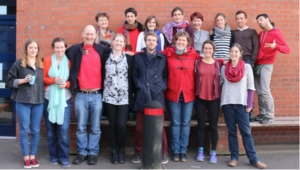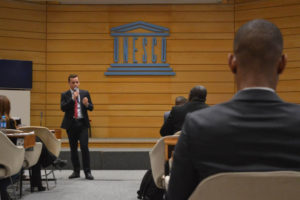Perform is a project funded by the European Union under its Horizon 2020 framework programme to innovate science education methods. It aims to combine performing arts and scientific research through participatory learning processes involving students from secondary schools, their teachers, early career researchers and science communicators. A team of European research institutions and professional performers with a longstanding experience in science and technology communication have been working over 2016 to evolve the way science shows and performances can incorporate students expectations, values, reflections around the wide concept of responsibility in research and innovation.
 Performing innovation in science learning
Performing innovation in science learning
Ramón y Cajal Research Fellow; PERFORM Coordinator
PERFORM is what happens when performing arts and scientific research are combined for the sake of innovating science education. This collaborative project actively involves secondary school students, teachers and early career researchers in inquiry-based learning about relevant scientific topics through the use of artistic performances at schools. Stand-up comedy, busking theatre and clown based on improvisational theatre are creatively applied as science education methods putting students at the centre of the learning process to engage them in STEM.
 Europe and beyond
Europe and beyond
The global dimension of Perform
by Casimiro Vizzini & Alex Da Silva – UNESCO
Education should not be seen just as a tool to respond to external demands, but it must also be considered as a proactive stakeholder influencing social, economic and cultural change. In order to meet this challenge, educational innovations play a key role in anticipating responses to emerging problems and offering new solutions to unresolved issues.
The concept of ‘Science for All’ was widely accepted as an urgent educational priority in 1983 (UNESCO, 1983) and it remains a priority because science and technology continue to affect our everyday lives in so many different ways.
 PERSEIAS – The ultimate science shows
PERSEIAS – The ultimate science shows
by Helena González & Oriol Marimon – The Big Van Theory
You may think in the 21st century that theatre may be no longer fashionable. We have youtube, Facebook and Netflix to know about life, to learn whatever we want to learn. We communicate to each other with smiley faces, likes and tweets. But theatre has something essential: face to face interaction and emotional attachment.
 Responsible science communicator
Responsible science communicator
by Eric Jensen – Warwick University
It takes critical reflection, evidence-based practice and a community of practice to develop responsible science communication
There are many different pathways into science communication. But rarely do these pathways involve critical reflection on what it means to be a ‘responsible’ science communicator. This kind of critical reflection is increasingly salient in an averred ‘post-fact’ world, marked by the wilful disregard of evidence in contexts such as Trump and Brexit. Debates about ‘value’ that have been gaining ascendance in arts and culture spheres may take on greater significance for science communicators in 2017 and beyond.
 Responsible Research and Innovation and education processes
Responsible Research and Innovation and education processes
by María Heras – Institut de Ciència i Tecnologia Ambientals (ICTA)
Universitat Autònoma de Barcelona (UAB)
What does it really mean to incorporate the RRI values on education processes? How do we disentangle the concept and put it into practice? This short article approaches these questions by framing the concept of RRI in science education and providing insights for its practical implementation.
 Engaging students with science using performing arts
Engaging students with science using performing arts
by Sarah Eagle & Jon James – Graduate School of Education, University of Bristol
What young people learn in science classrooms doesn’t fit together with drama, arts and languages; drama is for one thing, science for another. True or false? What has performing arts got to offer to science teachers?
Turn back the clock and you’ll find a very long period when the word ‘arts’ meant something more like industry and technology; science, on the other hand, meant reliable, official knowledge, and included the study of meaning, religion, logic, and ethics. How did we get to our own separation between the arts and the sciences?
 Training reflexive researchers
Training reflexive researchers
by Livio Riboli-Sasco & Claire Ribrault – Atelier des Jours A Venir
Atelier des Jours à Venir implemented a training for PhD students in France. Three woman have been trained to adopt a reflexive approach on their research practice. We guided them to find the words to present with full transparency their research, which includes a description of historical developments of their discipline, the implicit values of their community, the hierarchical organization of their labs, potential gender biases, funding schemes and conflicts of interest.
